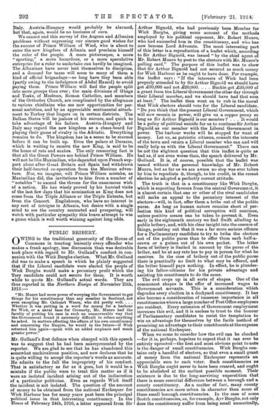THE AEGEAN AND ALBANIAN PROBLEMS.
ALTHOUGH the difficulty of disposing of the Aegean Islands so as to satisfy both Turkey and Greece, not to mention Italy and Austria-Hungary, is by no means overcome, we feel fairly confident that a settlement will be reached without a disturbance of the peace. Turkey and Greece, it is true, have both inserted formidable reservations in the general consent they originally gave to the declaration of the Powers that the disposal of the islands was a matter for the Powers alone. But when Turkey, at least, plays her immemorial game of setting one Power against another and juggling with words till the last possible moment, it is not to be expected that Greece will look on in silence. She cannot afford to appear to be indifferent. It is true, again, that the jealous conflict between Austria-Hungary and Italy in the Adriatic puts a spoke continually in the slowly re- volving wheel of European diplomacy. But several con- siderations snake us believe that Austria-Hungary and Italy will not let their relations reach the breaking-point. One is that Germany will not allow Italy to become a more lukewarm member of the Triple Alliance than she is already ; Germany will call Austria-Hungary to heel if necessary, and Austria-Hungary will obey as she has done before. Another consideration is that Italy has the greater part of her attention engaged in North Africa, where she has spent large sums of money, and where she has a task interesting and exacting enough to engage her for a generation. But the strongest reason of all for believing that the Aegean compli- cation will not end in war is that Roumania is once more acting as a steadying influence. She has announced that she will not tolerate another war between Turkey and Greece, and she has the power, if not to impose peace, at all events to cause both Turkey and Greece to think many times before defying her wishes. Roumania is, of course, the one Balkan Power which remained perfectly fresh and ready to take the field at the end of the exhausting period that rent South-Eastern Europe. There is almost certainly an understanding between Roumania, Greece, and Servia, and if Turkey knows this to be a fact she will not dream of "taking on" such a combination. The understanding which we have assumed has never been publicly pro- claimed, because the challenge to Austria-Hungary would seem to be too marked to be overlooked; but as everyone knows, a great many perilous and apparently provocative policies may be safely undertaken by people who are wise enough not to talk too much about them. That this com- bination will come into the field, then, to settle the immediate Aegean problem does not seem at all likely. It is more probable that Turkey and Greece will settle their dispute of their own accord by direct negotiation. Lastly, among the circumstances which make war between Turkey and Greece improbable may be mentioned the fact that ultimately it would be easy for the Powers to coerce both of them by sea. There is no question here of the old difficulty of having to land international armies, with the consequential difficulty of withdrawing them. The Powers, we do not forget, are not in agreement to such an extent that they would join in a coercive policy at present, but there is always the possibility—which both Turkey and Greece bear in mind—that they might suddenly come to such a point of agreement.
On Friday week the Powers communicated to Greece their decision as to the Aegean Islands and the Southern Albanian frontier. Greece is to keep all the islands occupied by her except Tenedos, Imbros, and Castellorizzo. She is required to guarantee that the islands shall not be used for naval or military purposes, and that the rights of the Mohammedan minorities shall be respected. The formal recognition of Greek ownership will not, however, take place until Greece has evacuated Southern
Albania. The evacuation of the territory which they call Epirus is, of course, a nasty leek for the Greeks to swallow; but if the new Albanian kingdom is to have resources of any value it is essential that Southern Albania should be part of the kingdom, as the Powers unanimously perceived. In the disposal of the islands Greece is being treated very well, and if she is wise she will recognize that she cannot have both Southern Albania and the islands assigned to her. The good must be balanced against the bad. The present plan is that the evacuation of Southern Albania shall be begun at Boritza and be completed by the end of March. The Note which was presented to Greece on Friday week was presented to the Porte on the next day. The Ports, in its customary manner, offered objections at once. Turkey would try to secure her just demands ; the islands of Chios and Mytilene were as indispensable to her as the islands in the immediate neighbourhood of the Dardanelles; she accepted the islands of Imbros, Tenedes„ and Castellorizzo, but the restitution of them by no means safeguarded the Turkish Empire. These arguments are, of course, only the particular expression of the knowledge that the Powers are in a state of merely nominal agree- ment. Great Britain, for instance, apparently gave her sanction to the presentation of the Notes, but Sir Edward Grey did not pretend that they altogether represented hie wishes. Turkey, of course, draws the conclusion that coercion is a long way off, and that there is still plenty of time to temporize.
The Greek Government took longer than the Porte to consider their reply to the Note of the Powers. They too raised objections, though they were more amenable in tone than the Turkish reply. The Greek Government, they said, will evacuate Southern Albania if the religious freedom and the proper education of their people are guaranteed. They demand that the coast opposite Corfu shall not be fortified, and they require protection for the islands they are not allowed to fortify for themselves. They promise protection to Turkish minorities in the islands, but ask for similar undertakings from Turkey with regard to the Greeks in the islands restored to her. It is impossible to deny the logic of both the Greek and Turkish replies in one respect. If the Greeks are not to fortify Chios and Mytilene--the former the scene of the most terrible massacre of Greeks by Turks in all history—they will lie open to Turkish raids, and it is natural to ask for a guarantee of safety. The Turks, on their side, more vaguely, but still logically, say : "The very fact that you refuse to allow the Greeks to fortify their new islands proves that you regard them as jumping-off places for attacks on Turkey. How do we know that the Greeks will observe the condition of non-fortification ? Some day you may relax the condition yourselves. So long as the Greeks hold these islands a dagger is pointed at the heart of Turkey. You cannot expect us to consent."
The Aegean question, unfortunately, does not concerts Turkey and Greece alone. Italy still holds the islands she occupied during her war with Turkey, and it is not certain that she will withdraw, even though the conditions of her withdrawal, as arranged at Lausanne, may be said to have been fulfilled in all except some purely technical senses. The fact is that the withdrawal of Italy from the islands depends upon the satisfaction of her claims for concessions in the district of Adalia, in Asia Minor. Italy wants to establish there what she pleasantly talks of as a "sphere of work." Her claims clash, however, with the existing rights of the Smyrna-Aidin Railway Company—a British company. Turkey is inclined to grant what con- cessions she can to Italy at Adalia—she granted a first instalment last summer—because she would rather make many concessions than fail to regain the islands occupied
by Italy. It is thought possible that, having regained the Dodecanese, as the islands occupied by the Italians are called, she might barter with Greece and recover Mytilene and Chios. We cannot guess what settlement will be arrived at, but we should like to make this general remark on the negotiations : that although the rights of a British railway are involved, Great Britain ought to endeavour to fall in with every Italian wish that is in any way reasonable. It is not our business to quarrel with 'Italy. Even if she made up her mind to retain some Aegean islands there would be no cause for objec- tions or anxiety on our part. We ought to look upon such dealings as matters that concern only Turkey and Italy. Austria-Hungary would probably be alarmed, but that, again, would be no businese of ours.
We cannot end this survey 'of the Aegean and Albanian problems without expressing our sincere good wishes for the success of Prince William of Wied, who is about to enter the new kingdom of Albania and proclaim himself the ruler of the people. A more picturesque, a more "sporting." a more hazardous, or a more speculative enterprise for a ruler to undertake can hardly be imagined. The Albanians have never lent themselves to discipline, and a demand for taxes will seem to many of them a kind of official brigandage—so long have they been able (partly owing to the indulgence of Abdul Hamid) to avoid paying them. Prince William will find the people split into more groups than ever ; the main divisions of Ghegs and Tasks, of Moslems, Roman Catholics, and members of the Orthodox Church, are complicated by the allegiance to various chieftains who see new opportunities for per- eonal ambition, and by an appreciable sentimental attach- ment to Turkey that lingers on in certain districts. The Balkan States will be jealous of his success, and quick to take advantage of his failure. Austria-Hungary and Italy may regard the new kingdom as a chess-board for playing their game of rivalry in the Adriatic. Everything remains to do. The kingdom has in a sense to be rescued before it can be built up. Even the palace at Duress°. which is waiting to receive the new King, is said to be the home of rats and snakes. The only reassuring fact is that all the Great Powers are behind Prince William. He will not be like Maximilian, who depended upon French sup- port alone after Great Britain and Spain had withdrawn their half-hearted co-operation from the Mexican adven- ture. Nor, we imagine, will Prince William mistake, as Maximilian did, the invitations to him from a number of "notables " to ascend the throne for the unanimous wish of a nation. He has wisely proved by his hurried visits of the last few days that his nomination as King does not come from the Triple Alliance or the Triple Entente, but from the Concert. Englishmen, who have no interest in any sort of intrigue in Albania, but desire with a single mind to see the country contented and prospering, will watch with particular sympathy this brave attempt to win a game which is well worth winning against long odds.















































 Previous page
Previous page